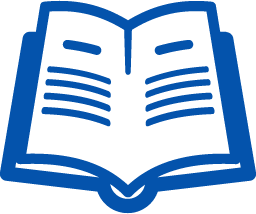Identifying Autism Symptoms in Toddlers / Autism Symptoms in Babies
ASD is diagnosed when the child has impaired communication, social interaction and show repetitive behaviours.
Impairment in Communication
They may have delayed speech and language skills; or they start speaking early but with unusual language development, odd intonation (like an American-sounding child in a Mandarin-speaking family) or are obsessed with certain topics. They are also not good at starting a conversation with people.
Impairment in Social Interaction and Play Skills
They can be oblivious to the people around them and don’t make eye contact. More often than not, they are interested in playing alone, with specific things that interest them such as trains (read about trains, play with trains and everything about trains). They may be interested to play with peers but don’t know how. So they become
disruptive, rowdy or may hit others in order to get their attention. They lack imagination in their play or become rote with specific scenes and have difficulty with pretend or role-play.
Stereotypic Behaviors and Patterns
They have specific repetitive behaviors such as running in circles, lining things in rows, spinning or spot jumping especially when unoccupied, bored, unhappy or upset. They can become rote in routines such as specific seats, routes and schedules. So they may not adapt well to changes in the environment or schedules. They may also be sensitive to certain stimuli such as sound, fixated with certain textures and intolerant to touch. Educational or behavior therapy develops an autistic child’s social and language skills through highly structured and customized training.
Source: https://www.sgh.com.sg/patient-care/conditions-treatments/autistic-spectrum-disorder-child
Early Signs of ASD in Toddlers ⎯ 1.5, 2 and 3 years old
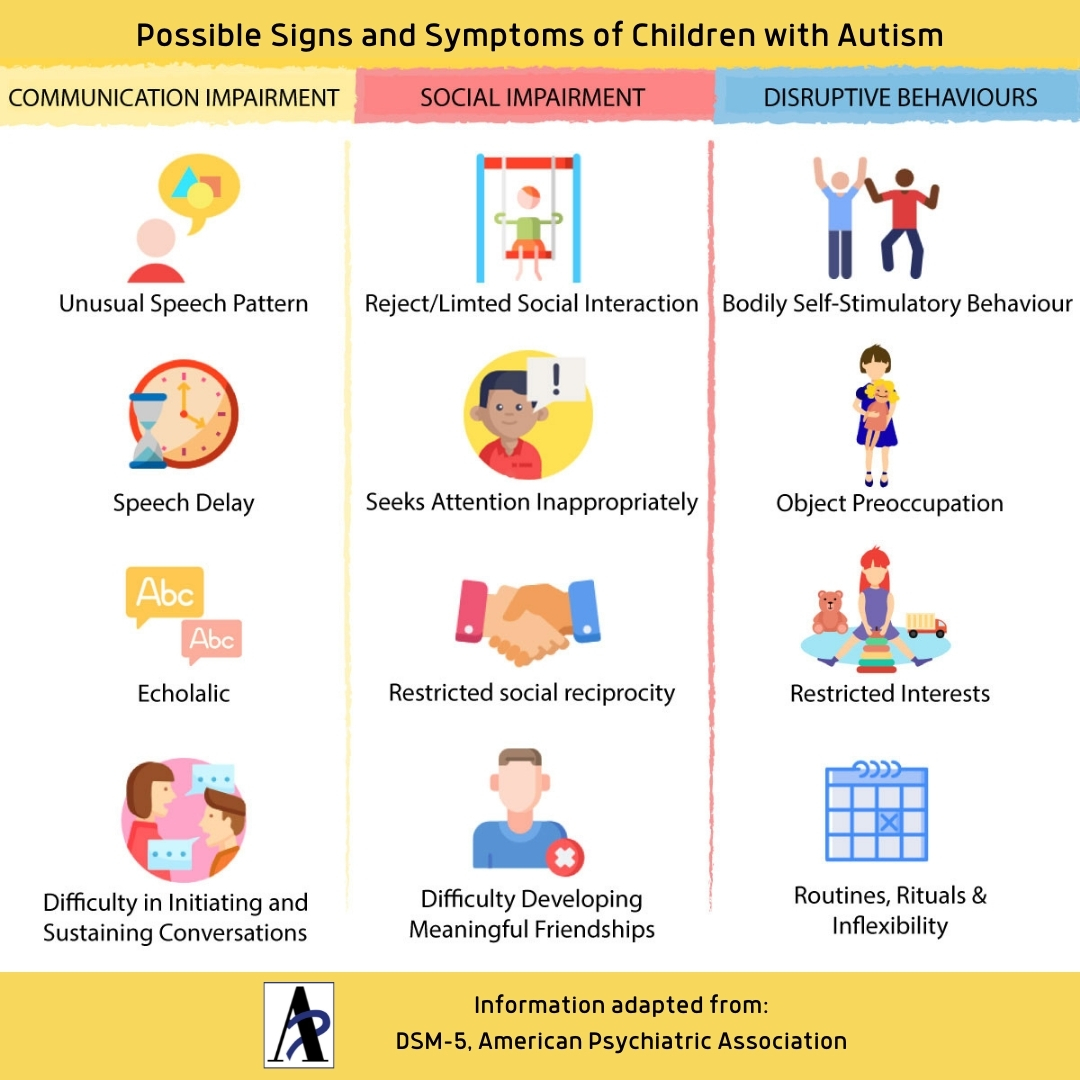
Autism Spectrum Disorder (ASD) typically appears during the early years of life. Early assessment and intervention are crucial to a child’s long-term success.
Some early warning signs include:
– No social smiling by 6 months to no two-word phrases by 24 months
– Poor eye contact
– Not showing items or sharing interests
– Unusual attachment to one particular toy or object
– Not responding to sounds, voices, or name
According to the Diagnostic and Statistical Manual of Mental Disorders version 5 (DSM 5, there are some excesses or deficits in children with autism in 3 main domains:
Social
Some children may display deficits in social‐emotional reciprocity; they may display abnormal social approach and failure of normal back and forth conversation, reduced sharing of interests, or even a total lack of initiation of social interaction. They may also find it difficult in developing and maintaining relationships, ranging from difficulties adjusting behavior to suit different social situations to an apparent absence of interest in people.
Verbal and Non-verbal Communication
As for the deficits in communicative behaviors, you may notice unnatural eye contact and body‐language, deficits in understanding and use of nonverbal communication, to a total lack of facial expression or gestures.
Behaviour and Interest
Lastly, for behaviour and interest impairment, one may notice repetitive speech, motor movements, and/or use of objects. There may also be excessive fixation to routines and strong attachment or preoccupation with unusual objects and activities, ritualized patterns of verbal or nonverbal behavior, or excessive resistance to change.
Some children may also be hyper‐or hypo‐reactive to sensory input or unusual interest in sensory aspects of the environment such as indifference to pain/heat/cold, adverse response to specific sounds or textures, fascination with lights or spinning objects and so on.
As stated in DSM 5, symptoms together limit and impair everyday functioning.
Early ASD Signs in Babies & Toddlers
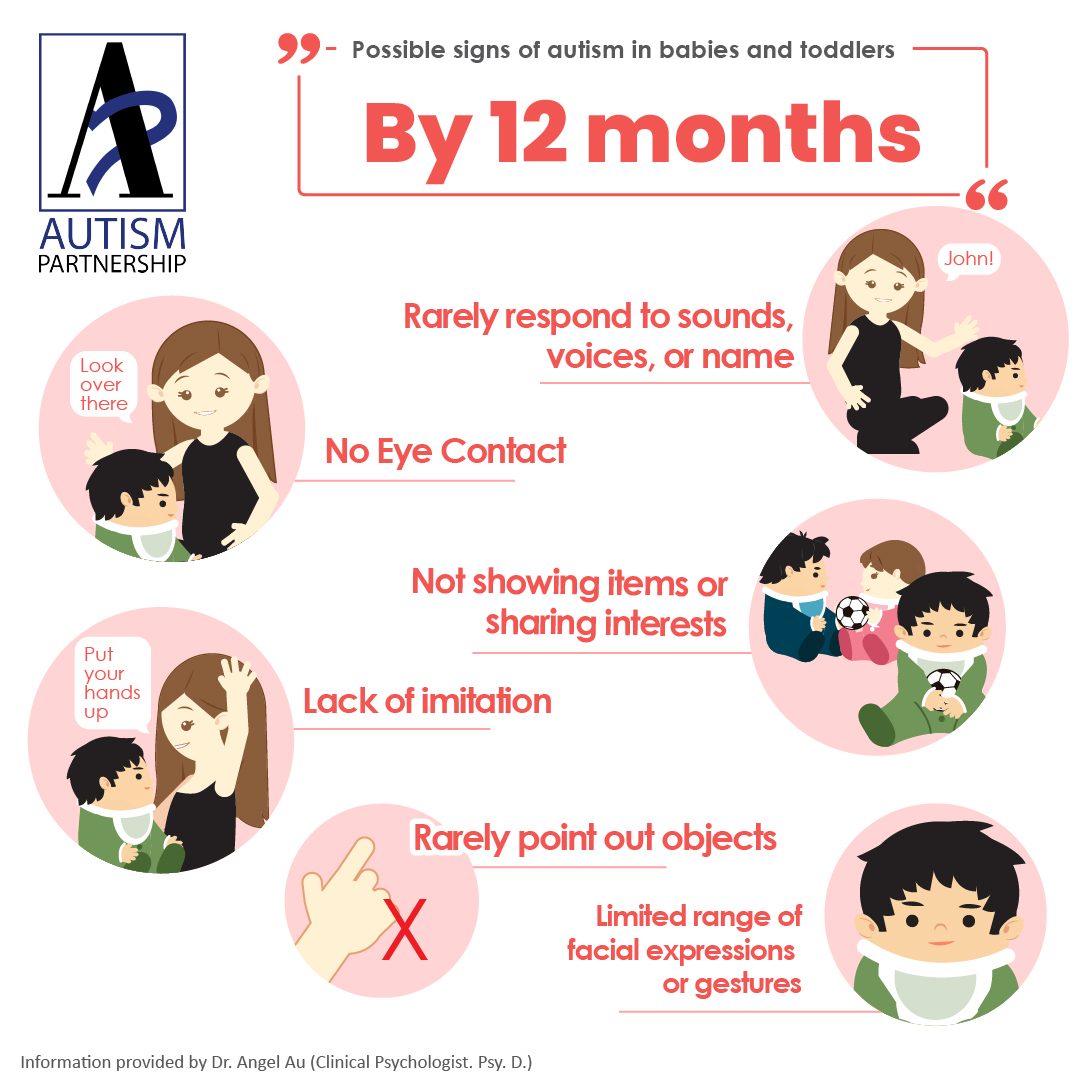
Autism Symptoms in Babies
ASD Signs at 12 Months / 1 Year Old
- Rarely respond to sounds, voices or name
- No eye contact
- Not showing items or sharing interest
- Lack of imitation
- Rarely point out objects
- Limited range of facial expressions or gestures
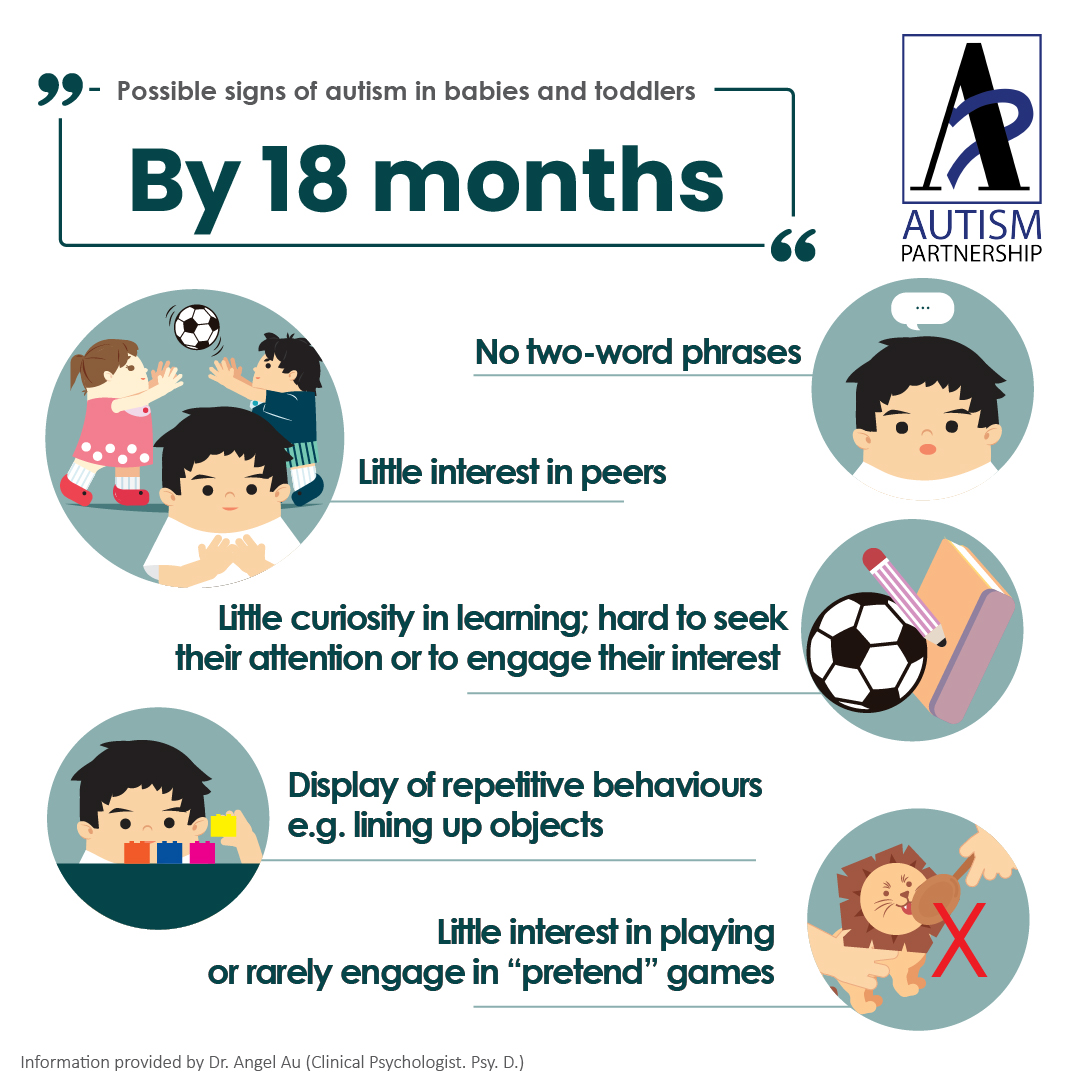
Autism Symptoms in Toddlers
ASD Signs at 18 Months / 1.5 Years Old
- No two-word phrases
- Little interest in peers
- Little curiosity in learning, hard to seek their attention or to engage their interest
- Display of repetitive behaviours e.g. lining up objects
- Little interest in playing or rarely engage in “pretend” games
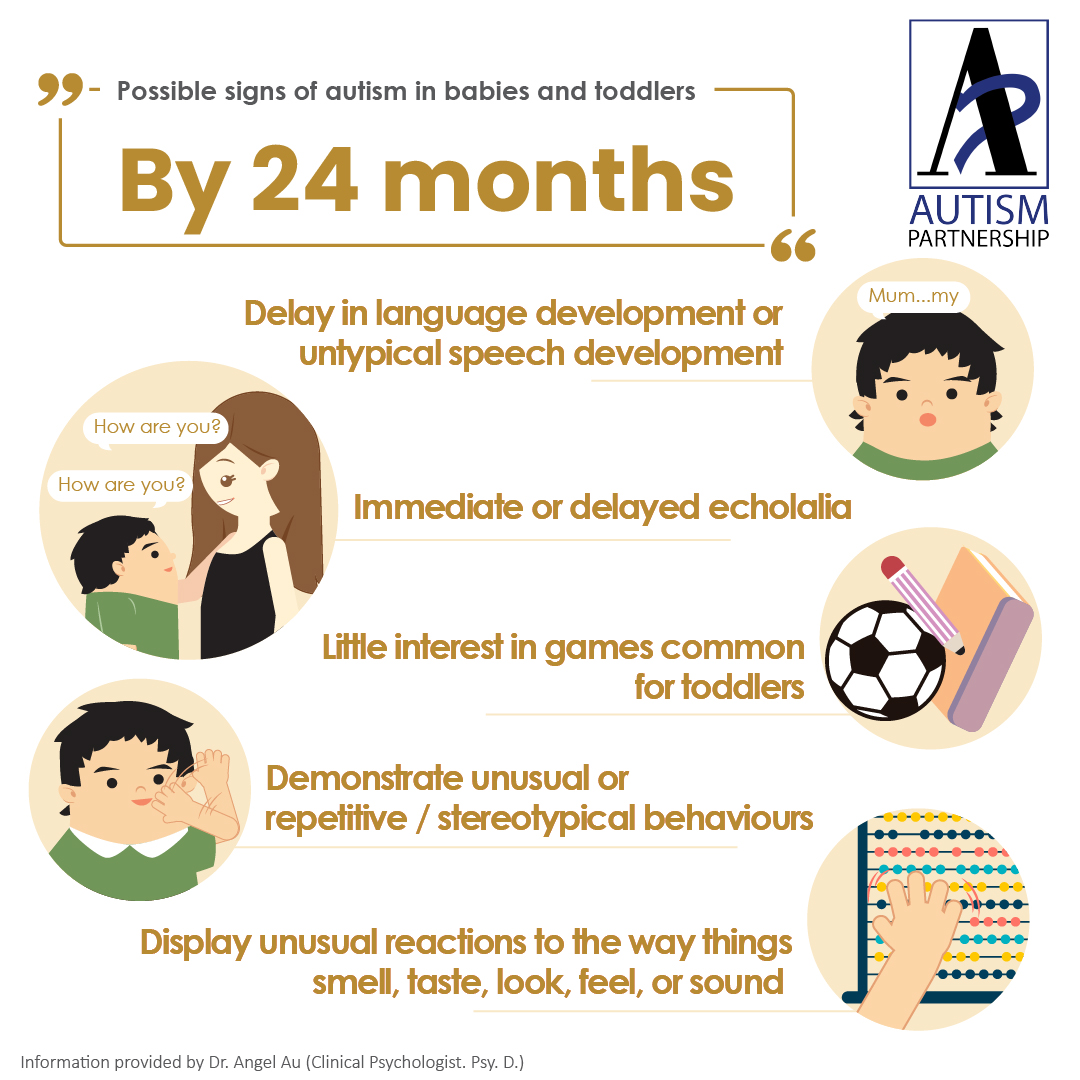
Autism Symptoms in Toddlers
ASD Signs at 24 Months / 2 Years Old
- Delay in language development or untypical speech development
- Immediate or delayed echolalia
- Little interest in games common for toddlers
- Demonstrate unusual or stereotypical behaviours
- Display unusual reactions to the way things, smell, taste, look, feel or sound
ASD Signs & Symptoms Developmental Milestones by Age
The American Academy of Pediatrics recommends that children be screened for general development using standardized, validated tools at 9, 18, and 30 months and for autism at 18 and 24 months or whenever a parent or provider has a concern. Ask your child’s doctor about your child’s developmental screening.
Take this with you and talk with your child’s doctor at every well-child visit about the milestones your child has reached and what to expect next.
What most children do by 18 months
At 18 months, your child is due for general developmental screening and an autism screening, as recommended for all children by the American Academy of Pediatrics. Ask the doctor about your child’s developmental screening.
Developmental Milestones: 18 Months
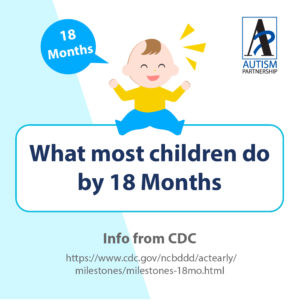
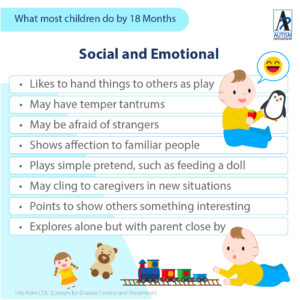
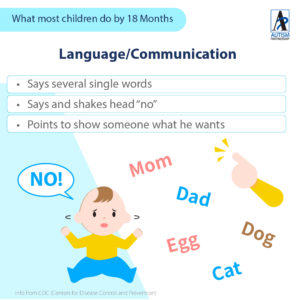
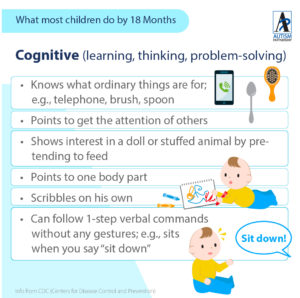
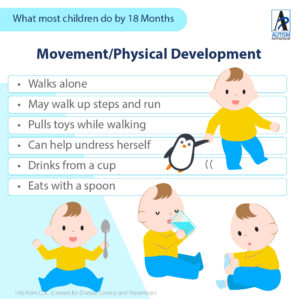
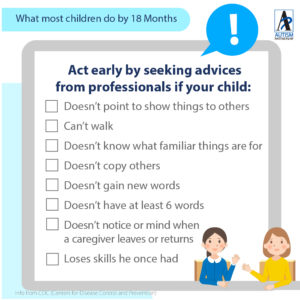
- Likes to hand things to others as play
- May have temper tantrums
- May be afraid of strangers
- Shows affection to familiar people
- Plays simple pretend, such as feeding a doll
- May cling to caregivers in new situations
- Points to show others something interesting
- Explores alone but with parent close by
- Says several single words
- Says and shakes head “no”
- Points to show someone what he wants
- Knows what ordinary things are for; for example, telephone, brush, spoon
- Points to get the attention of others
- Shows interest in a doll or stuffed animal by pretending to feed
- Points to one body part
- Scribbles on his own
- Can follow 1-step verbal commands without any gestures; for example, sits when you say “sit down”
- Walks alone
- May walk up steps and run
- Pulls toys while walking
- Can help undress herself
- Drinks from a cup
- Eats with a spoon
- Is missing milestones
- Doesn’t point to show things to others
- Can’t walk
- Doesn’t know what familiar things are for
- Doesn’t copy others
- Doesn’t gain new words
- Doesn’t have at least 6 words
- Doesn’t notice or mind when a caregiver leaves or returns
- Loses skills he once had
Tell your child’s doctor or nurse if you notice any of these signs of possible developmental delay and ask for a developmental screening.
Source: CDC (2021)
What most children do by the age of 2
At 2 years, your child is due for general developmental screening and an autism screening, as recommended for all children by the American Academy of Pediatrics. Ask the doctor about your child’s developmental screening.
Developmental Milestones: 2 Years Old
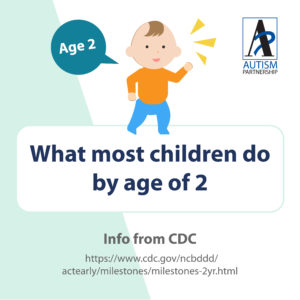
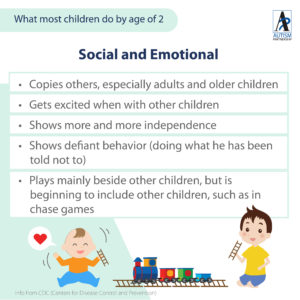

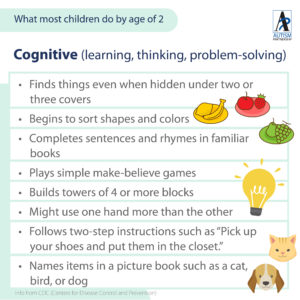
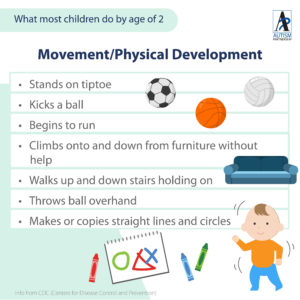
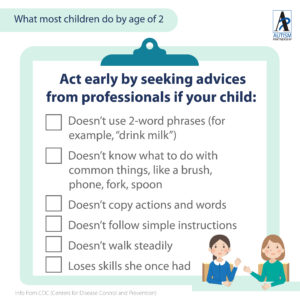
- Copies others, especially adults and older children
- Gets excited when with other children
- Shows more and more independence
- Shows defiant behavior (doing what he has been told not to)
- Plays mainly beside other children, but is beginning to include other children, such as in chase games
- Points to things or pictures when they are named
- Knows names of familiar people and body parts
- Says sentences with 2 to 4 words
- Follows simple instructions
- Repeats words overheard in conversation
- Points to things in a book
- Finds things even when hidden under two or three covers
- Begins to sort shapes and colors
- Completes sentences and rhymes in familiar books
- Plays simple make-believe games
- Builds towers of 4 or more blocks
- Might use one hand more than the other
- Follows two-step instructions such as “Pick up your shoes and put them in the closet.”
- Names items in a picture book such as a cat, bird, or dog
- Stands on tiptoe
- Kicks a ball
- Begins to run
- Climbs onto and down from furniture without help
- Walks up and down stairs holding on
- Throws ball overhand
- Makes or copies straight lines and circles
- Doesn’t use 2-word phrases (for example, “drink milk”)
- Doesn’t know what to do with common things, like a brush, phone, fork, spoon
- Doesn’t copy actions and words
- Doesn’t follow simple instructions
- Doesn’t walk steadily
- Loses skills she once had
Tell your child’s doctor or nurse if you notice any of these signs of possible developmental delay and ask for a developmental screening.
Source: CDC (2021)
What most children do by the age of 3
How your child plays, learns, speaks, acts, and moves offers important clues about your child’s development. Developmental milestones are things most children can do by a certain age. Check the milestones your child has reached by the end of 3 years by completing the checklist below.
Developmental Milestones: 3 Years Old
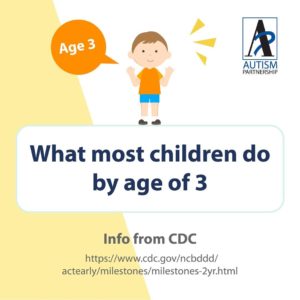
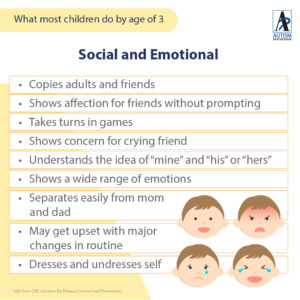
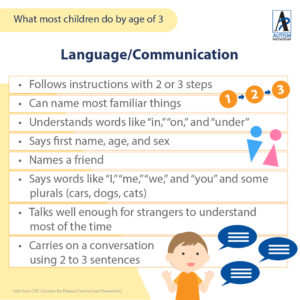
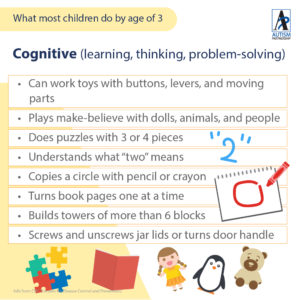
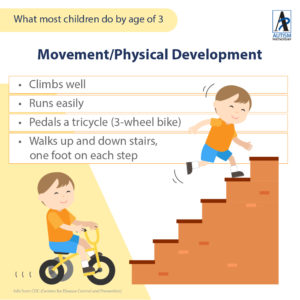
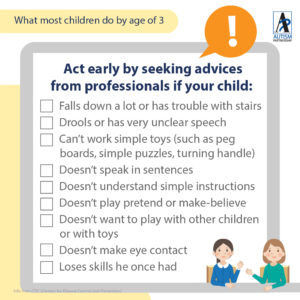
- Copies adults and friends
- Shows affection for friends without prompting
- Takes turns in games
- Shows concern for crying friend
- Understands the idea of “mine” and “his” or “hers”
- Shows a wide range of emotions
- Separates easily from mom and dad
- May get upset with major changes in routine
- Dresses and undresses self
- Follows instructions with 2 or 3 steps
- Can name most familiar things
- Understands words like “in,” “on,” and “under”
- Says first name, age, and sex
- Names a friend
- Says words like “I,” “me,” “we,” and “you” and some plurals (cars, dogs, cats)
- Talks well enough for strangers to understand most of the time
- Carries on a conversation using 2 to 3 sentences
Cognitive (learning, thinking, problem-solving)
- Can work toys with buttons, levers, and moving parts
- Plays make-believe with dolls, animals, and people
- Does puzzles with 3 or 4 pieces
- Understands what “two” means
- Copies a circle with pencil or crayon
- Turns book pages one at a time
- Builds towers of more than 6 blocks
- Screws and unscrews jar lids or turns door handle
- Climbs well
- Runs easily
- Pedals a tricycle (3-wheel bike)
- Walks up and down stairs, one foot on each step
- Falls down a lot or has trouble with stairs
- Drools or has very unclear speech
- Can’t work simple toys (such as peg boards, simple puzzles, turning handle)
- Doesn’t speak in sentences
- Doesn’t understand simple instructions
- Doesn’t play pretend or make-believe
- Doesn’t want to play with other children or with toys
- Doesn’t make eye contact
- Loses skills he once had
Tell your child’s doctor or nurse if you notice any of these signs of possible developmental delay and ask for a developmental screening.
Source: CDC (2021)

